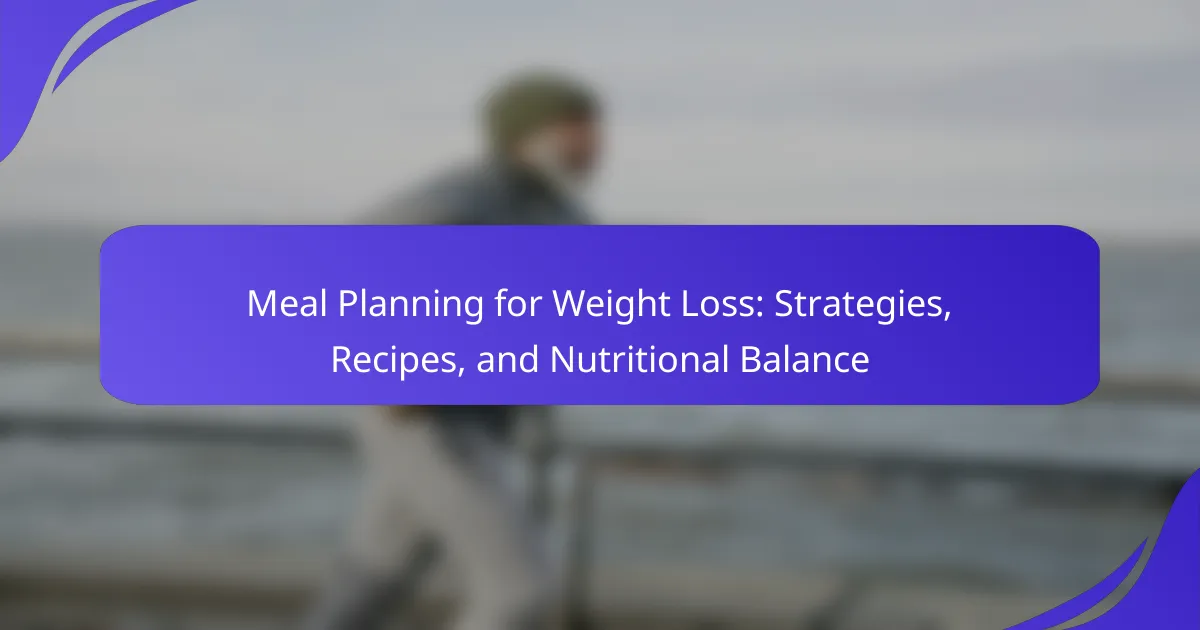Meal planning for weight loss can simplify your journey to a healthier lifestyle by promoting portion control and nutritional balance. This article will explore effective strategies, including goal setting, meal prep techniques, and tracking food intake. Discover a variety of healthy recipes tailored to support weight loss while ensuring essential nutrients are included. Learn how to customize meal plans to meet individual dietary needs and avoid common pitfalls.

What are the key strategies for effective meal planning for weight loss?
Effective meal planning for weight loss involves creating a structured approach to food choices and portion control. Focus on balanced meals that include lean proteins, whole grains, and plenty of fruits and vegetables.
Start by setting specific goals, such as daily calorie intake or macronutrient ratios. Prepare a weekly menu that incorporates a variety of healthy recipes to prevent boredom. Utilize meal prep techniques, like batch cooking, to save time and ensure you have healthy options readily available.
Track your food intake to stay accountable and make adjustments as needed. Consider portion sizes and use smaller plates to help manage serving sizes. Incorporating these strategies can lead to sustainable weight loss and improved overall health.
How does meal prepping contribute to weight loss?
Meal prepping significantly aids weight loss by promoting portion control and reducing impulsive eating. By planning meals in advance, individuals can ensure they consume balanced, nutritious options that align with their dietary goals.
Research indicates that meal prepping can lead to healthier food choices, as it often incorporates whole foods and minimizes reliance on processed items. This practice can also save time and reduce stress related to daily meal decisions, fostering adherence to a weight loss plan.
Additionally, meal prepping allows for better tracking of caloric intake and macronutrient distribution, essential components for effective weight management. Studies show that those who engage in meal prepping are more likely to maintain a consistent diet, leading to sustainable weight loss outcomes.
What role do portion sizes play in meal planning?
Portion sizes are crucial in meal planning as they directly influence calorie intake and nutritional balance. Proper portion control helps create a calorie deficit necessary for weight loss. Research shows that larger portions lead to increased consumption, making it challenging to maintain a healthy diet. Adopting standard serving sizes can aid in managing hunger and preventing overeating. Additionally, understanding portion sizes fosters better food choices, enhancing overall dietary quality.
How can tracking food intake enhance meal planning success?
Tracking food intake significantly enhances meal planning success by providing data-driven insights. It helps identify eating patterns, portion sizes, and nutritional balance, leading to more informed choices. Regular tracking can reveal caloric intake and macronutrient distribution, which are essential for weight loss. As a result, individuals can adjust their meal plans to align with their weight loss goals effectively. This approach fosters accountability and encourages mindful eating habits, ultimately supporting sustainable weight loss.
What tools can assist in tracking food intake?
Mobile apps and wearable devices can effectively assist in tracking food intake. Popular tools include MyFitnessPal, Lose It!, and Cronometer, which offer features like barcode scanning, meal logging, and nutritional analysis. These tools help users maintain a balanced diet, crucial for weight loss.
What are the benefits of incorporating variety in meal planning?
Incorporating variety in meal planning enhances nutritional balance and prevents dietary fatigue. This approach encourages the consumption of diverse food groups, ensuring essential vitamins and minerals. Additionally, it fosters creativity in the kitchen, making meals more enjoyable. Regularly changing recipes can also help maintain motivation for weight loss goals, as it reduces the likelihood of boredom with meals.

What essential nutrients should be considered in meal planning?
Essential nutrients for meal planning include proteins, carbohydrates, fats, vitamins, and minerals. These components ensure balanced meals that support weight loss effectively.
1. Proteins: Essential for muscle repair and growth; aim for lean sources like chicken, fish, and legumes.
2. Carbohydrates: Provide energy; focus on whole grains and fiber-rich vegetables.
3. Fats: Necessary for hormone production; include healthy fats from avocados, nuts, and olive oil.
4. Vitamins: Support various bodily functions; incorporate a variety of fruits and vegetables for a broad spectrum.
5. Minerals: Important for bone health and metabolic processes; ensure adequate intake of calcium, potassium, and iron.
Balancing these nutrients helps create satisfying meals that promote weight loss while maintaining overall health.
How do macronutrients influence meal planning for weight loss?
Macronutrients significantly influence meal planning for weight loss by providing essential energy and nutrients. Balancing carbohydrates, proteins, and fats can enhance satiety and promote fat loss.
Carbohydrates serve as the body’s primary energy source, while proteins support muscle maintenance and repair. Healthy fats contribute to hormone regulation and nutrient absorption. A common strategy is to prioritize high-fiber carbohydrates and lean proteins to improve fullness and reduce overall calorie intake.
For effective meal planning, consider a macronutrient distribution such as 40% carbohydrates, 30% protein, and 30% fats. This balance can aid in achieving a sustainable calorie deficit. Tracking these macronutrients helps maintain nutritional balance while promoting weight loss.
What are the ideal ratios of carbohydrates, proteins, and fats?
The ideal ratios of carbohydrates, proteins, and fats for weight loss are typically 40% carbohydrates, 30% proteins, and 30% fats. These ratios support balanced energy levels and promote muscle retention while losing weight. Adjustments may be necessary based on individual goals and activity levels. For example, a more active person might increase protein intake to support muscle recovery.
What micronutrients are crucial for overall health during weight loss?
Micronutrients such as vitamins and minerals are essential for overall health during weight loss. Key micronutrients include vitamin D, calcium, iron, and magnesium, which support metabolic processes and energy production. Vitamin D aids in calcium absorption, while iron is crucial for oxygen transport. Magnesium supports muscle function and energy production. A balanced intake of these micronutrients can enhance weight loss efforts and promote overall well-being.

What unique meal planning approaches cater to specific dietary needs?
Meal planning for weight loss can be tailored to specific dietary needs through various unique approaches. One effective method is the creation of meal plans based on macronutrient ratios, such as low-carb or high-protein diets. These plans focus on specific attributes like calorie control and nutrient density, which are essential for weight loss. Another approach is incorporating meal prepping, where meals are prepared in advance to maintain portion control and reduce impulsive eating.
Additionally, using tools like food diaries or apps can help individuals track their intake and identify patterns, making it easier to stick to dietary goals. Customizing recipes to include lower-calorie ingredients or substituting high-calorie items can also align with personal preferences while supporting weight loss. Overall, these strategies enhance nutritional balance and cater to individual dietary requirements.
How can meal planning accommodate vegetarian or vegan diets?
Meal planning can effectively accommodate vegetarian or vegan diets by focusing on plant-based proteins, whole grains, and nutrient-rich vegetables. Incorporating a variety of legumes, nuts, and seeds ensures adequate protein intake.
Meal planning strategies include batch cooking, which saves time and reduces food waste, and using seasonal produce for freshness and flavor. Recipes can feature dishes like quinoa salads, lentil soups, and vegetable stir-fries, which are both satisfying and nutritious.
Maintaining nutritional balance is essential; consider incorporating fortified foods or supplements to meet vitamin B12 and iron needs, which are often lower in plant-based diets.
What strategies work for gluten-free meal planning?
Gluten-free meal planning benefits from structured strategies that enhance nutritional balance and support weight loss. Focus on whole foods, such as fruits, vegetables, lean proteins, and gluten-free grains like quinoa and brown rice.
Incorporate meal prep techniques, such as batch cooking and portion control, to simplify the process. Consider using a meal planning app to track your recipes and grocery lists efficiently.
Experiment with gluten-free recipes that align with your dietary goals, ensuring they are rich in fiber and essential nutrients. This approach not only aids in weight loss but also promotes overall health.
Stay mindful of hidden gluten in processed foods by reading labels carefully. This vigilance supports adherence to a gluten-free lifestyle while maintaining a balanced diet.
How can meal planning support individuals with food allergies?
Meal planning can significantly benefit individuals with food allergies by ensuring safe and nutritious meals. It allows for careful selection of ingredients, reducing the risk of allergen exposure.
Planning meals in advance helps individuals maintain a balanced diet while avoiding allergens. This approach promotes awareness of food labels and ingredient sourcing, enhancing overall dietary safety.
Additionally, meal planning can support weight loss by incorporating nutrient-dense foods that align with specific dietary needs. This strategy aids in portion control and mindful eating, fostering healthier habits.
Ultimately, a structured meal plan tailored to food allergies not only safeguards health but also simplifies grocery shopping and meal preparation, making it easier to adhere to dietary restrictions.

What rare but impactful meal planning tips can enhance weight loss efforts?
Incorporating rare meal planning tips can significantly enhance weight loss efforts. Focus on batch cooking to save time and maintain portion control, ensuring meals are balanced and nutrient-dense.
Consider using flavor-enhancing herbs and spices instead of high-calorie sauces to keep meals exciting while reducing caloric intake. Experiment with meal prepping for the week, allowing for diverse, healthy options that prevent last-minute unhealthy choices.
Utilize a food diary to track not just calories, but also emotional triggers and patterns related to eating, which can provide insights into habits and help adjust meal plans effectively.
Lastly, explore intermittent fasting as a unique meal timing strategy that can promote fat loss while simplifying meal planning.
How does seasonal eating affect meal planning?
Seasonal eating enhances meal planning by promoting fresh, nutrient-dense ingredients aligned with local harvests. This approach can lead to improved nutritional balance and weight loss success.
Utilizing seasonal produce ensures meals are flavorful and varied. For instance, incorporating summer fruits like berries and fall vegetables such as squash can diversify nutrient intake.
Meal planning benefits from seasonal eating by reducing costs and supporting local farmers. Fresh ingredients often require less preparation, making it easier to maintain a consistent meal schedule.
Additionally, seasonal eating encourages mindful consumption, which can positively impact weight management. By focusing on what is currently available, individuals can create balanced meals that align with their health goals.
What are the benefits of incorporating cultural dishes into meal plans?
Incorporating cultural dishes into meal plans enhances variety, promotes nutritional balance, and supports weight loss. These dishes often include diverse ingredients that provide essential nutrients. For example, Mediterranean meals rich in vegetables and healthy fats can improve heart health and aid in weight management. Additionally, exploring different cuisines can make meal prep more enjoyable, reducing the likelihood of diet fatigue. Embracing cultural dishes encourages mindful eating and fosters a deeper connection to food traditions, which can lead to healthier choices overall.

What common mistakes should be avoided in meal planning for weight loss?
Common mistakes in meal planning for weight loss include failing to set realistic goals, neglecting portion control, and skipping meals. Overlooking nutritional balance can lead to deficiencies, while relying on processed foods may hinder progress. Additionally, not planning for cravings can result in unhealthy choices. Tracking food intake consistently is crucial for accountability.
How can unrealistic expectations derail meal planning efforts?
Unrealistic expectations can significantly hinder meal planning efforts by leading to frustration and burnout. When individuals set unattainable goals, such as drastic weight loss in a short time, they may abandon their plans altogether. Additionally, expecting perfection in meal preparation can result in stress and disappointment, making it harder to maintain a consistent routine. As a result, it’s crucial to set realistic, achievable objectives that promote sustainable habits rather than quick fixes.
What are the pitfalls of neglecting meal variety?
Neglecting meal variety can lead to nutritional deficiencies and decreased motivation. A limited diet often lacks essential vitamins and minerals, affecting overall health. Additionally, monotony can result in boredom, increasing the likelihood of unhealthy eating habits. To maintain a balanced diet, incorporate diverse foods that provide a wide range of nutrients.
How can lack of preparation lead to unhealthy choices?
Lack of preparation can lead to unhealthy choices by increasing impulsive eating behaviors. When individuals do not plan their meals, they are more likely to opt for convenient, processed foods that are high in calories and low in nutritional value. This often results in poor dietary habits, weight gain, and associated health risks. Meal planning promotes healthier food selections and portion control, helping to maintain a balanced diet.

What expert insights can optimize meal planning for weight loss?
Expert insights for optimizing meal planning for weight loss include focusing on portion control, nutrient-dense foods, and meal prep strategies. Prioritize whole foods like fruits, vegetables, lean proteins, and whole grains to enhance nutritional balance. Incorporate a variety of recipes to maintain interest and adherence. Utilize tools like food tracking apps to monitor progress and adjust plans as needed. Consider unique attributes like individual dietary preferences and lifestyle factors to tailor meal plans effectively.
What best practices should be followed for sustained weight loss?
To achieve sustained weight loss, follow structured meal planning strategies that emphasize nutritional balance. Focus on portion control, incorporate a variety of food groups, and prioritize whole foods. Create a weekly menu to streamline grocery shopping and reduce impulsive eating.
Consider meal prepping to maintain consistency and avoid high-calorie convenience foods. Include high-fiber foods to enhance satiety and manage hunger. Track your meals to identify patterns and adjust as necessary.
Aim for a calorie deficit while ensuring adequate nutrient intake. Hydration plays a crucial role; drink plenty of water throughout the day. Lastly, be flexible and adjust your plan based on your progress and lifestyle changes.
How can meal planning be adjusted as weight loss progresses?
Meal planning should evolve as weight loss progresses to maintain motivation and adapt to changing needs. Adjustments can include varying portion sizes, incorporating new recipes, and focusing on nutrient-dense foods.
As weight loss occurs, caloric needs may decrease; thus, reducing portion sizes while ensuring adequate protein intake is crucial. Incorporating seasonal fruits and vegetables can enhance nutritional variety and keep meals interesting.
Tracking progress can help identify when to adjust macronutrient ratios, possibly increasing healthy fats or fiber to promote satiety. Regularly reassessing goals and preferences ensures meal plans remain aligned with personal tastes and lifestyle changes.
Finally, consulting with a nutritionist can provide personalized insights, making meal planning more effective and sustainable throughout the weight loss journey.
What resources are available for ongoing meal planning support?
Meal planning support resources include apps, websites, and community programs. Popular meal planning apps like MyFitnessPal and Lose It! offer customizable meal tracking and recipe suggestions. Websites such as EatingWell and AllRecipes provide extensive databases of healthy recipes tailored for weight loss. Community programs, including local nutrition classes and online forums, offer guidance and accountability. These resources enhance nutritional balance and simplify the meal planning process for weight loss.



